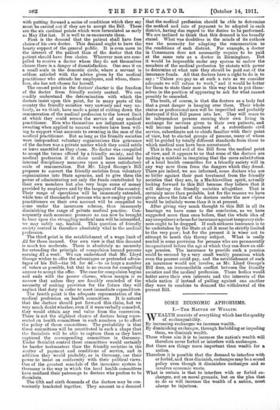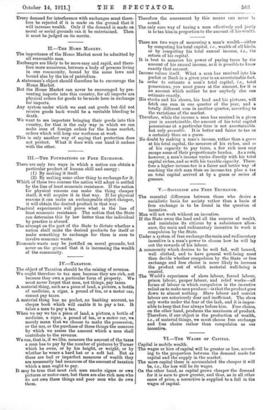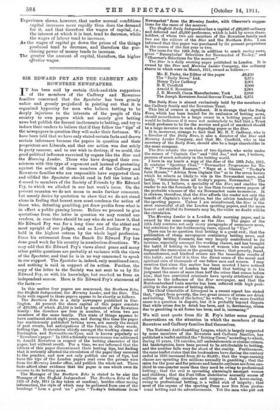W EALTH consists of everything which has the quality of exchangeability.
By increasing exchanges we increase -wealth.
By diminishing exchanges, through forbidding or impeding them, we diminish wealth.
Those whose aim it is to increase the nation's wealth will therefore never forbid or interfere with exchanges. But there are things more important than wealth for a nation.
Therefore it is possible that the demand to interfere with or forbid, and thus diminish, exchanges may be a sound policy even though it diminishes exchanges and so involves economic waste.
What is certain is that to interfere with or forbid ex- changes, not on moral grounds, but on the plea that to do so will increase the wealth of a nation, must always be injurious. Every demand for interference with exchanges must there- fore be rejected if it is made on the ground that it will increase wealth. Only if the demand is made on moral or social grounds can it be entertained. Then it must be judged on its merits.
n.-THE HOME MARKET.
The importance of the Home Market must be admitted by all reasonable men.
Exchanges are likely to be more easy and rapid, and there- fore more numerous, between a body of persons living in one community, bound by the same laws and bound also by the tie of patriotism. A statesman's object should therefore be to encourage the Home Market.
But the Home Market can never be encouraged by pre- venting imports into this country, for all imports are physical orders for goods to be made here in exchange for imports. Any system under which we sent out goods but did not receive goods back would be a veritable bleeding to death.
We want to see importers bringing their goods into this country, for that is the only way in which we can make sure of foreign orders for the home market, ' orders which will keep our workmen at work. This is only another way of saying that protection does not protect. What it does with one hand it undoes with the other.
Ill.-THE FOUNDATIONS OF FREE EXCHANGE.
There are only two ways in which a nation can obtain a particular product of human skill and energy : (1) By making it itself.
(2) By making some other thing to exchange for it. Which of these two courses the nation will adopt is settled by the line of least economic resistance. If the nation for physical reasons can make the thing cheaper itself, it will acquire it in that way. If for physical reasons it can make an exchangeable object cheaper, it will obtain the desired product in that way.
Practical experiments will prove what is the line of least economic resistance_ The notion that the State can determine this by law better than the individual by practice is absurd.
The attempt on the part of the State to dictate whether a nation shall make the desired products for itself or make something to exchange for them is sure to involve economic waste.
Economic waste may be justified on moral grounds, but never on the ground that it is increasing the wealth of the community.
IV.—Taxamorr.
The object of Taxation should be the raising of revenue. We ought therefore to tax men because they are rich, not because they own a particular form of property. We must never forget that men, not things, pay taxes. A material thing, such as a piece of land, a picture, a bottle of medicine, a cigar, a pound of tea, or a motor car, cannot pay taxes.
A material thing has no pocket, no banking account, no cheque book which will enable it to pay a tax. It takes a man to pay a tax.
When we say we tax a piece of land, a picture, a bottle of medicine, a cigar, a pound of tea, or a motor car, we merely mean that we choose to make the possession, or the use, or the purchase of these things the measure by which we assess the amount which a man shall contribute to the revenue.
We can, that is, if we like, measure the amount of the taxes a man has to pay by the number of pictures by Turner which he owns, or by his height, or weight, or by whether he wears a hard hat or a soft hat. But as these are bad or imperfect measures of wealth they are necessarily bad measures of the amount of taxation which a man ought to pay.
It may be true that most rich men smoke cigars or own pictures or motor-cars, but there are also rich men who do not own these things and poor men who do own them. Therefore the assessment by this moans can never bt sound.
The only sure way of taxing a man effectively and justly is to tax him in proportion to the amount of his wealth.
There are two ways of measuring a man's wealth—either by computing his total capital, i.e., wealth of all kinds, or by computing his total annual income, i.e., the return of his capital. It is best to measure his power of paying taxes by the amount of his annual income, as it is possible to know exactly that amount. Income values itself. What a man has received into his pocket or Bank in a given year is an ascertainable fact. In order to estimate a man's total capital, i.e., total possessions, you must guess at the amount, for it is an amount which neither he nor anybody else can estimate exactly. His stocks and his shares, his land and his pictures, will fetch one sum in one quarter of the year, and a totally different sum in another quarter, according to the variations of the market.
Therefore, while the income a man has received in a given year is ascertainable, the amount of his total capital possessions at a particular time is not ascertainable but only gitessable. It is better and fairer to tax on a certainty than on a guess. No doubt by making a man's income, rather than a guess at his total capital, the measure of his riches, and so of his capacity to pay taxes, a few rich men may escape some of their proportionate burden. As a rule, however, a man's income varies directly with his total capital riches, and so with his taxable capacity. There- fore a higher income-tax is a fairer and better way of reaching the rich man than an income-tax plus a tax on total capital arrived at by a guess or series of guesses.
V.-SOCIALISM AND FREE EXCHANGE.
The essential difference between those who desire a socialistic basis for society rather than a basis of free exchange is to be found in the question of incentive.
Man will not work without an incentive.
If the State owns the land and all the sources of wealth, and maintains its citizens by a subsistence allow- ance, the main and rudimentary incentive to work is compulsion by the State.
Under a system of free exchange the main and rudimentary incentive is a man's power to choose how he will lay out the rewards of his labour.
A. community which desires to be well fed, well housed, well clothed, and to have general well-being must then decide whether compulsion by the State or free exchange and free choice is more likely to increase the product out of which material well-being is created.
The World's experience of slave labour, forced labour, prison labour, pauper labour, and relief works—all forms of labour in which compulsion is the incentive relied on to make men produce—is that the product goes down to almost nothing. Slave labour and convict labour are notoriously dear and inefficient. The slave only works under the fear of the lash, and it is impos- sible to keep that fear always before him. Free choice, on the other hand, produces the maximum of product. Therefore, if our object is the production of wealth, i.e., of material things, we must choose free exchange and free choice rather than compulsion as out incentive.
WAGES OF CAPITAL.
Capital is mobile wealth.
The wages or hire of capital will be greater or less, accord- ing to the proportion between the demand made for capital and the supply in the market. The more capital there is accumulated the cheaper it will be, i.e., the less will be its wages.
On the other hand, as capital grows cheaper the demand for it is sure to grow greater, and thus, as in all other cases of price, a corrective is supplied to a fall in the wages of capital. Experience shows, however, that under normal conditions capital increases more rapidly than does the demand for it, and that therefore the wages of capital, i.e., the interest at which it is lent, tend to decrease, while the wages of labour tend to increase.
As the wages of capital go down the prices of the things produced tend to decrease, and therefore the pur- chasing power of money tends to increase.
The greater the amount of capital, therefore, the higher effective wages.




















































 Previous page
Previous page